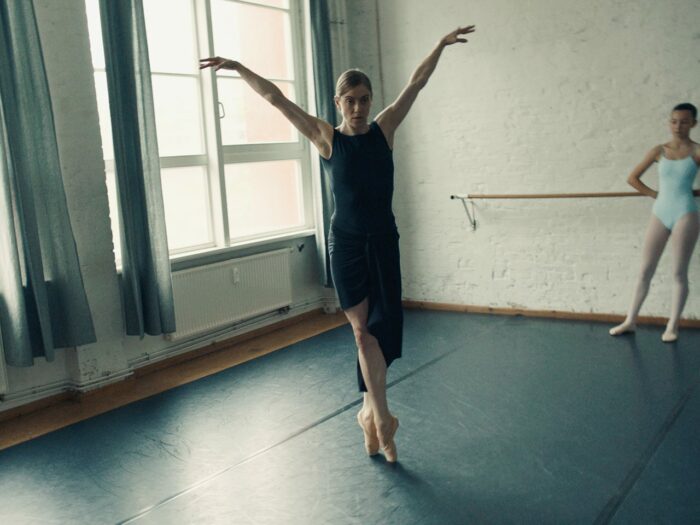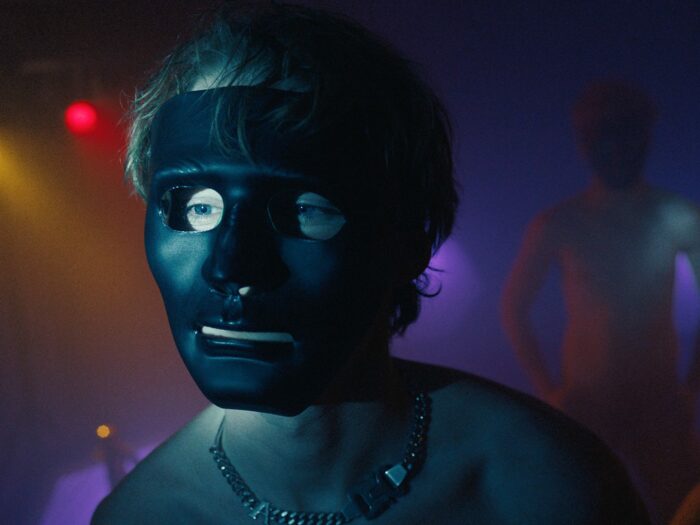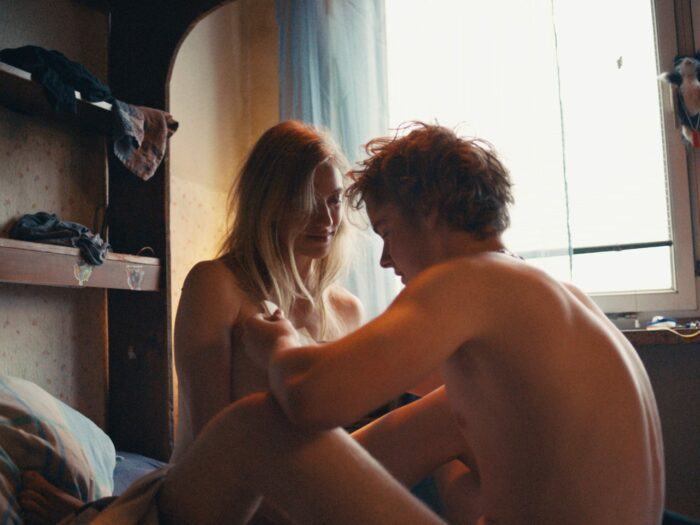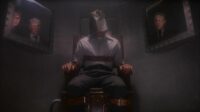Isabelle Stever’s latest feature Grand Jeté opens with a richly detailed, elegantly shot character study. In tightly-framed, intimately composed detail, cinematographer Constantin Campean’s camera closely tracks professional ballet instructor Nadja (Sarah Nevada Grether) through and after a swimming session. Her tight muscles, bloody toes, and skin rash suggest a body in rebellion, one protesting after too many years of too much abuse. Nadja no longer performs professionally but lends her gravitas and expertise to her young charges, where she commands their respect with her stern, unwavering affect and poised, controlled maneuvers.

Much of Grand Jeté follows, cinematically, this same highly effective stylistic approach, following Nadja through her interactions, sometimes at such an intimate angle that nothing other than her lithe, bony dancer’s back is seen onscreen. There’s little of the traditionally expository data you might glean from a more traditional approach: we learn only that Nadja suffers, physically, from the accumulated tortures of her profession, and mentally, from a lifelong obsession with her craft. She self-medicates to manage the pain, now needs a cane (which she rejects) to assist herself, and largely ignores her unnamed live-in.
A grand jeté, she instructs her students, is when “you are in the air for a second. Nothing is behind or in front of you. That’s your grand jeté.” The maneuver seems to serve as a metaphor for Nadja’s own life. What’s behind her is not exactly nothing, but it’s clear her own aspirations are long behind her. And what’s in front? A mystery—until a visit to her mother for a birthday celebration reconnects her with her estranged, now fully-grown son Mario (Emil von Schönfels).

And here is where Grand Jeté hovers in mid-air, suspended between an earnest psychological character study and something far more explicit and taboo. Like Nadja, Mario is also obsessed with his own body, his workout routines, and physical performances, and the two of them reconnect on a club dance floor, where Nadja’s rigorously planned and executed routines give way to a dance of extemporaneous passion. At a kink club, Mario performs in a contest of physical stamina that requires him to hold a weight with his penis longer than the other competitors, and Nadja cheers him on.
And for some inexplicable reason the two—mother and son—are from there drawn into a highly charged, mutually fulfilling, and explicitly sexual relationship. Stever and Campean continue to chart the pair’s evolving dynamic with a curiously dispassionate subjectivity: the camera remains ever close to Nadja, suggesting that in now pursuing an illicit sexual relationship with her son she is looking for what lands in front of her, her lifelong obsession with dance having consumed her to the point where any rational action is moot. Wracked by a life of pain, she seeks now what gives her pleasure.

Aside from Nadja’s mother, few other characters appear onscreen, and neither Nadja nor Mario is shown in meaningful conversation with any other character. So there’s no one to comment on the inappropriateness of their relationship: it is, in the film, what it is. A brief scene between Nadja and her mother helps to explain from where her perversity originates, and as a whole the film observes and studies but does not condemn Nadja’s incest. What, I wonder, of Mario’s? Nothing I could observe suggests why he might be perfectly sanguine in exploring a sexual relationship with his own estranged mother.
In the tradition of great dance films, from The Red Shoes and Summer Interlude to The Turning Point, The Company, and Black Swan, one expects a degree of physical and emotional torment from performers obsessed with and committed to their art. In this sense, Grand Jeté does not disappoint, but Nadja’s days of performance are long past. Here, the focus is more on the psychological and physical costs wrought by a career that has consumed Nadja. In attempting to find purpose and passion beyond the stage, her “reconnection” with her son makes not for a happy reunion but instead a new set of problems—ones that are, the film suggests, inherited and taught from one generation to the next.
In spite of its transgressive subject matter, Grand Jeté never stoops to exploit its taboo content. Its sex scenes—and there are more than one, involving increasing levels of kink—are shot too in the same fastidiously intimate manner as the rest of the film, giving them a sense of the mundane or everyday. Until one remembers, of course, that they depict the most Oedipal of taboos. Grand Jeté’s appeal might be limited to those comfortable with the occasionally explicit nature of European arthouse cinema, but its performances and cinematography make it a memorable, if highly discomforting, viewing experience.
Following its theatrical opening at Laemmle Royal and a subsequent limited theatrical release, Grand Jeté is scheduled to release on VOD October 25, 2022.




